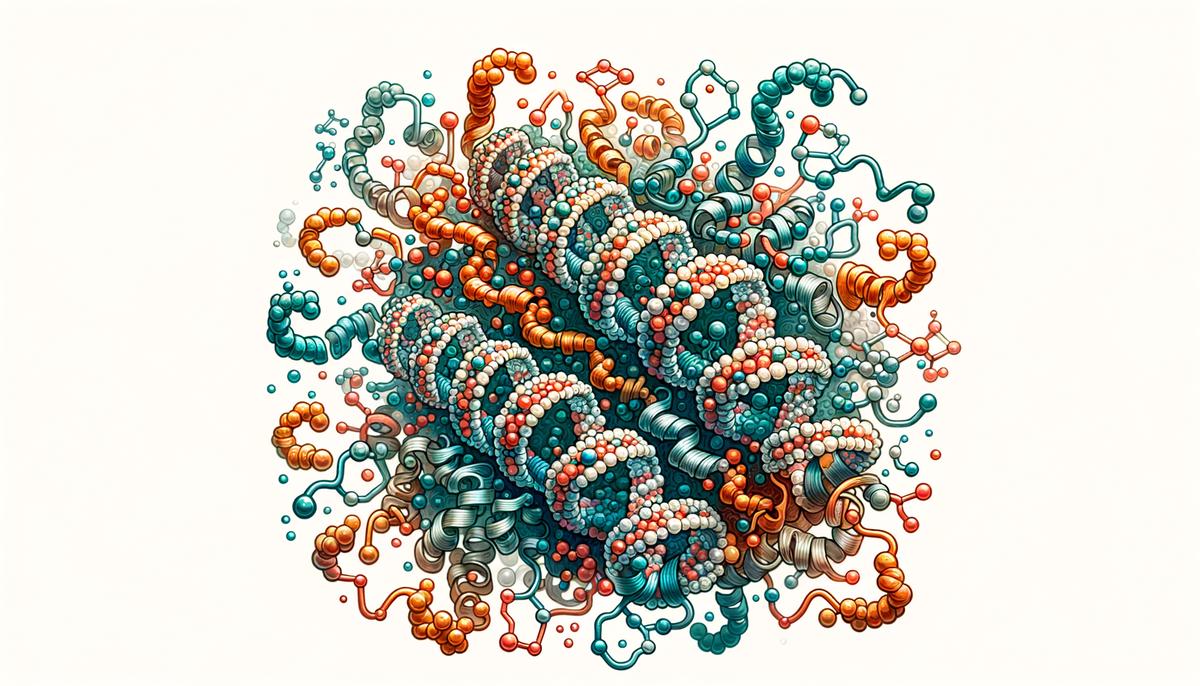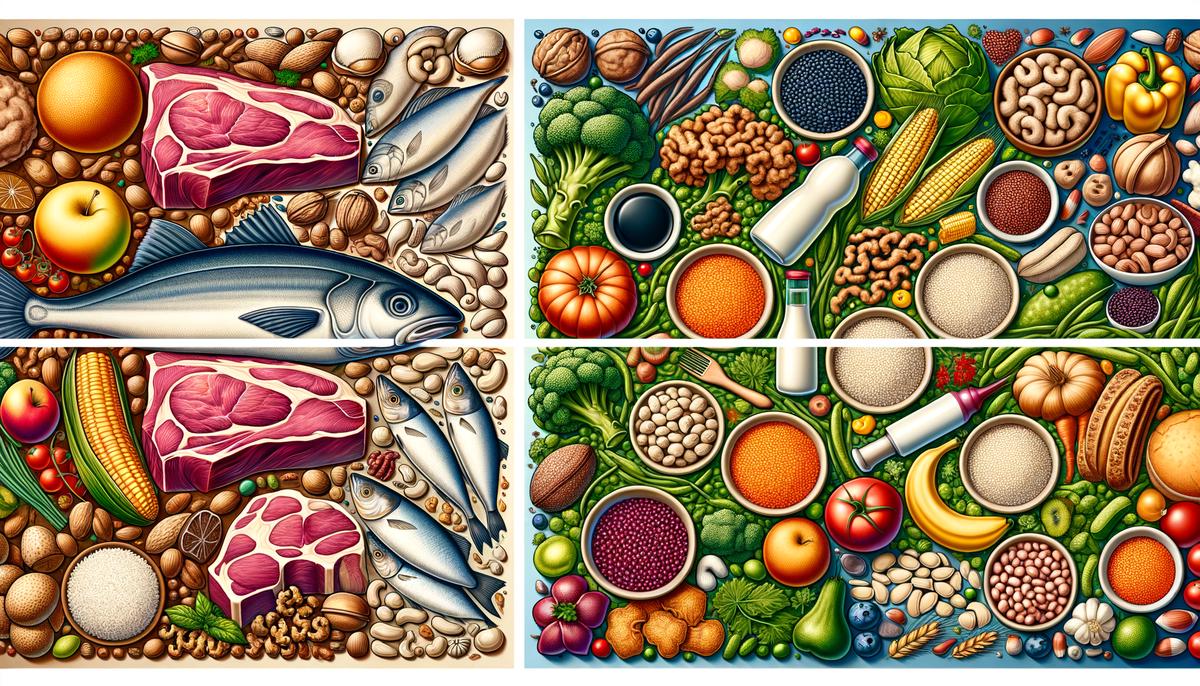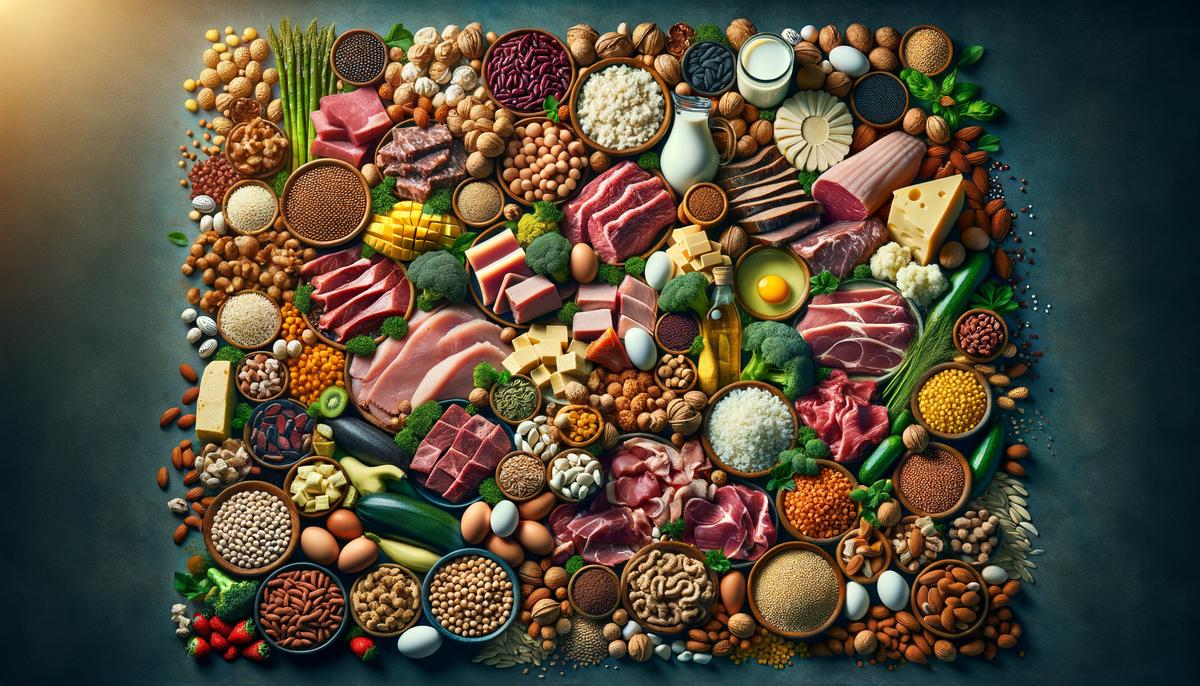Proteins play a crucial role in our bodies, influencing everything from muscle growth to hormone regulation. They are essential for various bodily functions and overall health. Gaining knowledge about the different types of proteins and their sources can help you make informed dietary choices that support your well-being.
Understanding Protein
Proteins are like the Swiss Army knives of the body, packed with amino acids, the little building blocks for pretty much everything. You consume carbs and fats for energy, but proteins? They roll up their sleeves and get to work. From muscle growth to hormone fluctuations, protein's got it all covered.
Amino Acids: The Little Helpers
Proteins get broken down into amino acids, and there are 20 of these little guys. The body can make some of them, but for nine of them, you need to hit the grocery store. These essential amino acids are crucial. Think chicken, eggs, tofu, and beans—all packed with these essential aminos.
Muscle Growth
Workouts break down muscle fibers, and protein repairs and builds 'em back up, ensuring you're not left with flabby flippers for arms.
Tissue Repair
Protein also helps repair your body's tissues. Got a cut? Protein's stitching it together. Pulled a muscle? Protein's got you covered.
Hormone Regulation
Protein's not just backstage; it's the director, controlling your mood, growth, metabolism, and even sleep patterns. Cortisol, insulin, testosterone—think of these as the maestros in the body's orchestra.
Enzymatic Actions
Enzymes, a type of protein, are the catalysts that keep your body running smoothly. They break down the food you eat and convert it into energy.
Fluid Balance
Proteins help balance fluids in your cells, making sure you're neither retaining too much water nor drying out.
Immune System
Proteins form antibodies that fend off invaders. Your immune system needs plenty of protein to whip up those antibodies.
Every Spoonful Counts
Proteins aren't stored up for a rainy day like fats and carbs. So you have to eat them regularly. Animal sources like meat, milk, and eggs are like full meals with all nine essential amino acids. Plant sources such as soy and quinoa are also great options.

Amino Acids
Let's dive deeper into the unsung heroes of the protein world: amino acids. Think of them as the tiny screws that hold everything together, from your muscles to your mood. And just like screws, not all amino acids are created equal.
Amino Acids: The Building Blocks
These little guys are grouped into three main categories: essential, non-essential, and conditionally essential.
Essential Amino Acids: The VIPs
Essential amino acids are crucial for muscle repair, immune function, and producing those "feel-good" hormones like serotonin. These include lysine, methionine, and tryptophan.
Non-Essential Amino Acids: The Utility Players
Non-essential amino acids are produced internally from other chemicals in the body, and include alanine, aspartic acid, and serine. They're indispensable when it comes to cell structure and metabolic processes.
Conditionally Essential Amino Acids: The Specialists
Conditionally essential amino acids like arginine, cysteine, and glutamine help manage stress, support immune function, and speed up recovery during intense periods.
Breaking Down the Role Call
Each type of amino acid has specific jobs, making them crucial for a well-oiled machine.
- Histidine: Essential for growth and repairing tissues.
- Isoleucine & Leucine: These amino acids help repair muscles post-exercise and contribute to energy production.
- Lysine: Aids muscle repair, calcium absorption, and collagen production.
- Tryptophan: A precursor for serotonin, which regulates mood and sleep cycles.
- Alanine: Helps convert glucose for energy, especially during workouts.
- Arginine: Boosts the immune system and promotes vasodilation.
- Glutamine: Key to intestinal health and immune support.
Fueling Your Body
Ensuring you get a good mix of essential, non-essential, and conditionally essential amino acids is vital. Foods rich in these amino acids range from meats and dairy to beans and tofu, so there's something for everyone.
It's about balance. Just like you wouldn't build a house with only nails and no wood, you can't just rely on one type of protein or amino acid. Mix it up, and your body will thank you.
Complete vs. Incomplete Proteins
Let's dive into the nitty-gritty of the protein world: complete versus incomplete proteins. It's like comparing a full-course meal to just a side dish—they both have their places but serve different needs.
Complete Proteins: The Whole Package
Complete proteins contain all nine essential amino acids that your body can't produce on its own. They're the VIPs you need at every meal to keep everything running smoothly.
Sources of Complete Proteins:
- Animal Proteins: Chicken, beef, pork, fish, dairy, and eggs.
- Some Plant-Based Options: Quinoa, soy products like tofu and tempeh, and buckwheat.
Incomplete Proteins: The Missing Puzzle Pieces
Incomplete proteins lack one or more of the essential amino acids, making them a bit of an incomplete deal on their own. But don't worry, with a bit of culinary matchmaking, you can combine them to hit the protein jackpot.
Sources of Incomplete Proteins:
- Plant Proteins: Beans, grains like rice, wheat, and barley.
- Nuts and Seeds: Almonds, peanuts, and sunflower seeds.
Combining Forces: The Dynamic Duo
Pairing foods in complementary ways creates a complete protein profile, meaning you're getting all the essential amino acids your body craves. Classic combinations are beans and rice, hummus and pita, or peanut butter and whole grain toast.
Examples of Winning Combos:
- Rice and Beans: The ultimate simple, inexpensive, and tasty combo.
- Hummus and Whole Grain Pita: Perfect for a Mediterranean munch.
- Peanut Butter on Whole Grain Bread: A protein powerhouse.
Why It Matters
Ensuring you get a mix of complete and incomplete proteins is akin to having a wardrobe with both basics and statement pieces. You need the complete proteins for sure-fire nutrient density, but the incomplete proteins round out your diet with fiber, vitamins, and minerals.
Balance is key. Just like you balance work and play, you balance your animal and plant proteins to keep your body in tip-top shape. So next time you're whipping up a meal, think about what team you're assembling on your plate.

Protein Sources and Supplements
Ready to explore the protein-packed world of food and supplements? Let's dive into the grocery aisles and supplement store to uncover all the protein-packed goodness from both animal and plant sources. From farm-raised chicken to garden-fresh beans, you'll learn how to build your protein arsenal.
Protein Sources: The Classics and Some Surprises
When it comes to animal-based proteins, the classics are hard to beat. These protein powerhouses have been dietary staples for centuries and come with a full set of amino acids.
Animal-Based Proteins:
- Chicken: The lean protein MVP. Grilled, baked, or in soups, it's versatile and fits into almost any dish.
- Eggs: A breakfast staple that's also great in salads and wraps. One egg packs about 6 grams of high-quality protein.
- Beef: Rich in iron and vitamin B12, beef delivers a hefty protein punch, though it's best enjoyed in moderation.
- Fish: Whether it's salmon with its Omega-3 fatty acids or lean tilapia, fish is a dual threat for protein and heart health.
- Milk and Dairy: A glass of milk, a cup of yogurt, or a slice of cheese gives you a protein boost with calcium.
Now, let's not forget our plant-based pals. These options are perfect for those going green or simply looking to add variety to their diet.
Plant-Based Proteins:
- Beans and Legumes: Black beans, kidney beans, lentils—all are brimming with protein and fiber.
- Chickpeas: Versatile and tasty in their whole form or mashed into hummus.
- Quinoa: This ancient grain is actually a seed that's packed with protein and works well as a rice substitute.
- Soy Products: Tofu, tempeh, and edamame are soy superstars. Tofu's mild flavor makes it a chameleon in the kitchen, absorbing whatever seasonings you throw at it.
- Nuts and Seeds: Almonds, peanuts, chia, and flax—these tiny ingredients pack a surprising amount of protein.
Protein Supplements: The Backup for Busy Days
If you're finding it hard to get enough protein through food alone, supplements can be a handy backup. Think of these as your protein pinch hitters, stepping in when life's busy schedule leaves you little time to prepare full meals.
Types of Protein Supplements:
- Whey Protein: The gold standard for protein shakes. Whey is rapidly absorbed and starts muscle protein synthesis quickly, making it popular post-workout.
- Casein Protein: A slow-digesting protein that's great to take before bed to help muscles repair overnight.
- Soy Protein: A plant-based protein that's great for those who avoid dairy. It's got a good amino acid profile and is often used in vegan protein powders.
- Pea Protein: Good for those with allergies, it's hypoallergenic and loaded with amino acids, even if it's a bit less efficient than whey.
- Hemp Protein: Packed with Omega-3 and Omega-6 fatty acids, this one's great for those looking to boost their heart health as well as their muscles.
- Collagen Protein: Popular for skin, hair, and joint health, collagen can also help with tissue repair, though it's not a complete protein.
Potential Contaminants: What to Watch Out For
Not all protein supplements are created equal, and some might contain unwanted extras. Before you buy, be aware of these potential contaminants:
- Heavy Metals: Some protein powders can contain lead, mercury, cadmium, and arsenic. You don't want those in your smoothie.
- BPA: Found in the plastic containers of some protein powders, BPA has been linked to several health issues.
- Artificial Additives: From sweeteners to preservatives, some powders are loaded with chemical extras that aren't doing your body any favors.
To avoid a protein powder pitfall, stick to products that are third-party tested. This ensures what's on the label is what's in the canister, without the extras you didn't order.
Choosing the Right Protein Supplement
With so many options, how do you choose wisely? Here's the breakdown:
- Goals: Match your supplement to your needs. Building muscle? Whey or casein. Looking to lose weight? Pick a low-carb option.
- Dietary Restrictions: Milk allergy? Soy, pea, or hemp are your friends. On a vegan diet? Skip the whey and collagen.
- Third-Party Testing: Look for labels like NSF or Informed Choice to ensure you're getting a clean product.
- Sweeteners: Choose natural over artificial. Stevia and monk fruit are often better choices than sucralose or aspartame.
- Ingredients List: Shorter is better. You want protein, not a list of a thousand unpronounceable chemicals.
Whether you're plucking chicken from the fridge or shaking up a post-workout protein drink, knowing your protein sources and supplement smarts can help keep your health on track. Every meal is an opportunity to nourish yourself with the building blocks that keep you strong and healthy.

Incorporating a variety of protein sources into your diet is key to maintaining good health. Whether you're opting for animal-based proteins or plant-based alternatives, ensuring you get a balanced mix will keep your body functioning optimally.
Leave a Reply